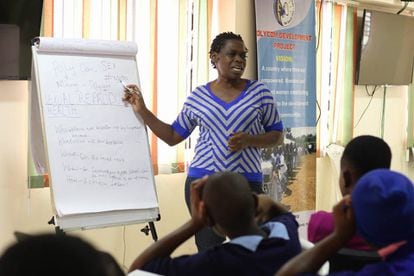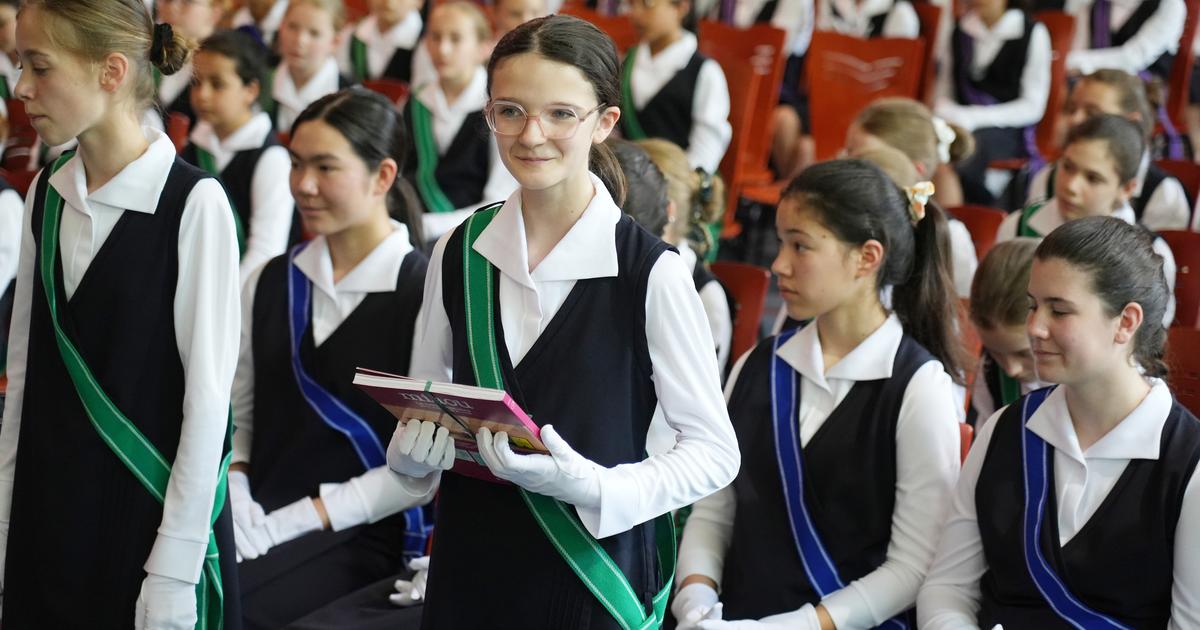In January 2003, the Kenyan government launched its free primary education policy.
However, students still encounter numerous obstacles that prevent them from taking full advantage of this valuable opportunity.
Schools require all students to wear a uniform, something many parents cannot afford.
Furthermore, in Africa children often have to deal with problems on their own.
Talking openly between parents and children is seen as embarrassing and disrespectful on both sides, so many children deal with their concerns without telling anyone and without help.
In order for the students to get more out of the free training, two campaigns were started that are now bearing fruit: Uchi Sheet and Talking Boxes.
In March 2016, a mother, Elizabeth Wanhoji, contacted Billian Okoth of Music Family, an organization that provides scholarships, talent development services and youth training to residents of Mathare, a Nairobi slum.
Wanhoji wanted the organization to buy uniforms for four suburban girls because the ones they wore to school were too old.
Okoth, 27, a musician and founder of Music Family, paid a visit to the school with some friends.
He saw that there were more students who needed them, and that's how Uchi File was born.
Uchi tab is a Swahili expression that means “cover your nakedness”.
The initial goal of the campaign was to provide uniforms to children in the suburbs of Mathare.
Okoth was born and raised there, and knows from experience what it's like to dress in a ragged suit.
Students at Kilimani Elementary School are measured to have uniforms made to fit them.Rahab Gakuru
"I went to school covered in shreds, and I know what it feels like," he recalls.
“In the Mathare slums almost half of the students go to class with torn clothes because their parents have very few resources.
If they have to choose between food, shelter and clothing, especially uniforms, which are considered a luxury, they will always have to wait.
This encouraged me to make sure the next generation was protected from ridicule."
According to a study carried out in Kenya by the Poverty Action Lab, until December 2002 students had to pay school fees to attend primary school. But in January 2003, new government measures established not only free of charge, but also basic notebooks and textbooks. The result was a dramatic increase in school enrollment. However, schools require students to wear uniforms, and experience indicates that reducing school costs by providing uniforms, among other incentives, encourages attendance.
“When I went to primary school my pants were torn, with patches and holes everywhere.
The kids laughed at me and called me flashlights and video by the two patches on the seat of my uniform pants.
(The nicknames lanterns and video have to do with the fact that the patches are always made of good quality new fabric, and rarely the same color as the uniform, so that they stand out from the rest of the garment, reminiscent of a flashlight or camera lens).
This was bad for my self-esteem and caused me to separate myself from the other classmates.
He was an outcast,” says Okoth.
Currently, Tarjeta Uchi distributes these suits throughout the country: in Nairobi, Kiambu, Kakamega, Machakos and Bondo.
In one year they have delivered 3,000 units in 30 different schools, which means an average of 100 per center.
Along the way they have suffered some setbacks. “We have not been very regular because we depend on people and organizations to join the project, while we are trailing their calendar. We need a structure that makes us sustainable in the future and in which dressmakers can make garments for children in need, because we supply schools that have been running for a long time in exchange for financial compensation. At the moment, we have created a volunteer network with 1,000 students from five universities”, explains the promoter of the project. Volunteers handle research, communications, and marketing. When Tab Uchi holds an event, they help organize with the schools by cooking and helping the seamstresses.
Rosemary Anyango is Kibera's head dressmaker. “I am very happy to be part of a group of people who have brought improvements to the community. I know we are changing the life of a child. The financial compensation is very small, but helping makes me happy. We receive the material and then five tailors from different suburbs of Nairobi and I sew them myself for a group of chosen students from different schools”.
“I want the uniform to be the last thing a child has to worry about,” says Okoth.
“The ones in poor shape affect their self-esteem, their confidence and how they relate to the other children at school.
It causes them to fall behind on their homework because they sit in the back of the class and don't get up to answer questions.
My motivation and my fight is to ensure that all children have decent clothing to ensure equality.”
boxes that keep secrets
In Kibera, the largest slum in sub-Saharan Africa, suffering in silence while enduring a problem has been the norm for many girls. The poor living conditions add to the economic difficulties, as the inhabitants of the settlement work as casual laborers in low-skilled jobs in the nearby industrial zone, living on less than two euros a day. They often do not have money to buy food and medicine or to pay for educational expenses. The scarcity of drinking water exposes the inhabitants of Kibera to a long list of hardships, including mistreatment. The problem is especially serious in the case of children.
The new Talking Boxes communication platform makes it easy for girls to talk openly about issues they can't talk about with their parents.
It is run by Polycom Development, an organization founded to respond to the violence and sexual exploitation faced by young girls in Kibera.
Its purpose is to help girls share what happens to them and what they feel.
Ann (a real name) is a sixth grader at Adventure Academy who is afraid to talk to her mother.
"I live with my stepfather," he says.
“In the holidays last year I told my mother that I wanted to visit my father, who lives in the village, and she hit me.
Since I'm afraid he'll do it again, I don't tell him anything anymore."
Talking Boxes founder Jane Anyango explains to female students how boxes work at a school in Kibera.Polycom Development
A young boy from Kibera faces numerous problems as he transitions from adolescence to adulthood.
The children live in the almost always hostile environment of the suburb, characterized by unemployment, substandard housing, large family sizes, violent crime, drugs and alcoholism.
A report by the Security Information and Research Center indicates that the cause of 61.2% of the crimes committed in slums is high youth unemployment, while poverty and the consumption of illegal drinks and drugs are behind 11, 3% and 9.5% respectively.
Young people are not dedicated to committing crimes that require technology or computer applications, but to extortion, illegal connections to the electricity grid, rape and robbery with violence.
Ann is grateful to Talking Boxes because she has a way to express herself without fear of being beaten.
“I can speak freely about my father from anonymity.
I realize that I will not be able to see it, but when I write the notes I know that someone is listening and helping me to face it”, acknowledges the young woman.
Jane Anyango, founder of the platform, believes that sharing anonymous notes is very useful.
The grades are placed in a locked mahogany box in a safe and appropriate place in the school.
Each week, a member of the Polycom Development project team opens the box, reads the messages, and tries to respond to the girls' concerns.
“We encourage them to tell us how to find them.
If they think they are in a problematic situation, we have to intervene right away,” explains Anyango.
They started in 2010 with very few resources.
At first they used cardboard boxes.
“It was very complicated because (students) broke them.
Then a volunteer made them for us out of wood”, says the promoter of the initiative.
There are currently boxes in 16 schools, and the plan is to reach 50 in the coming months.
Judy is a parent at Adventure Academy, and she recognizes how difficult it is to speak frankly with teenagers.
What happens if you are not able to solve the problem that your child raises?
Judy believes that the talking boxes provide an environment where they can express themselves without fear of being beaten by their parents.
"We would also like to know what kind of worries our daughters have so we can help them solve them," she adds.
“Detecting the signs of a case of sexual abuse about to happen and avoiding it is a great success for us”
Jane Anyango, founder of Talking Boxes
Some problems are overwhelming.
Jemimah didn't know who to talk to when she was raped.
Her friend Yvonne, a Talking Boxes ambassador, advised her to use the program.
“After removing the boxes, members of Polycom Development came to the school.
During a counseling session with the girls they managed to find out who the anonymous note was from, Jemimah was taken to hospital and then signed up for counseling services,” says Yvonne.
The greatest achievement of the Talking Boxes project is that more schools apply to be included in it. “Detecting the signs of a sexual abuse case about to happen and preventing it is a great success for us. We encourage other organizations to work with boys, because in order to have a society in which girls can develop, we need to prepare boys”, says Jane Anyango.
“The issue is not the schools or us, but the girls. We can identify them and follow their evolution and healing process. We want to create more awareness about the project because most people don't understand why it's important to express yourself without fear. But I am encouraged by the parents who come to thank us for the initiative. In the future I hope to expand the project beyond Kibera in order to reach as many girls as possible. We have organized football tournaments and conferences for girls to give them the opportunity to network, as well as to talk with the counselors who attend the events”, concludes Anyango.
You can follow PLANETA FUTURO on
,
and
, and subscribe
to our 'newsletter'
here
.







/cloudfront-eu-central-1.images.arcpublishing.com/prisa/VOT7MD2S4VGTBN4VUOZKAZMCQY.jpg)


/cloudfront-eu-central-1.images.arcpublishing.com/prisa/2C5HI6YHNFHDLJSBNWHOIAS2AE.jpeg)




